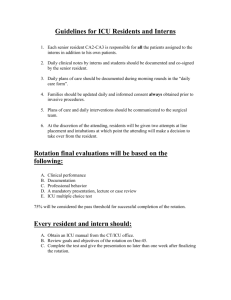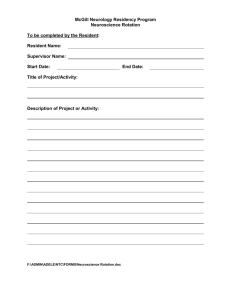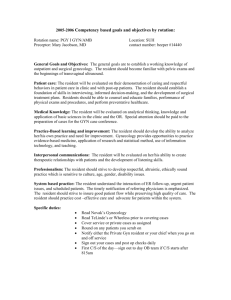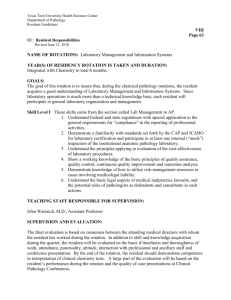III. Types of Clinical Encounters - Saint Francis Hospital and Medical
advertisement
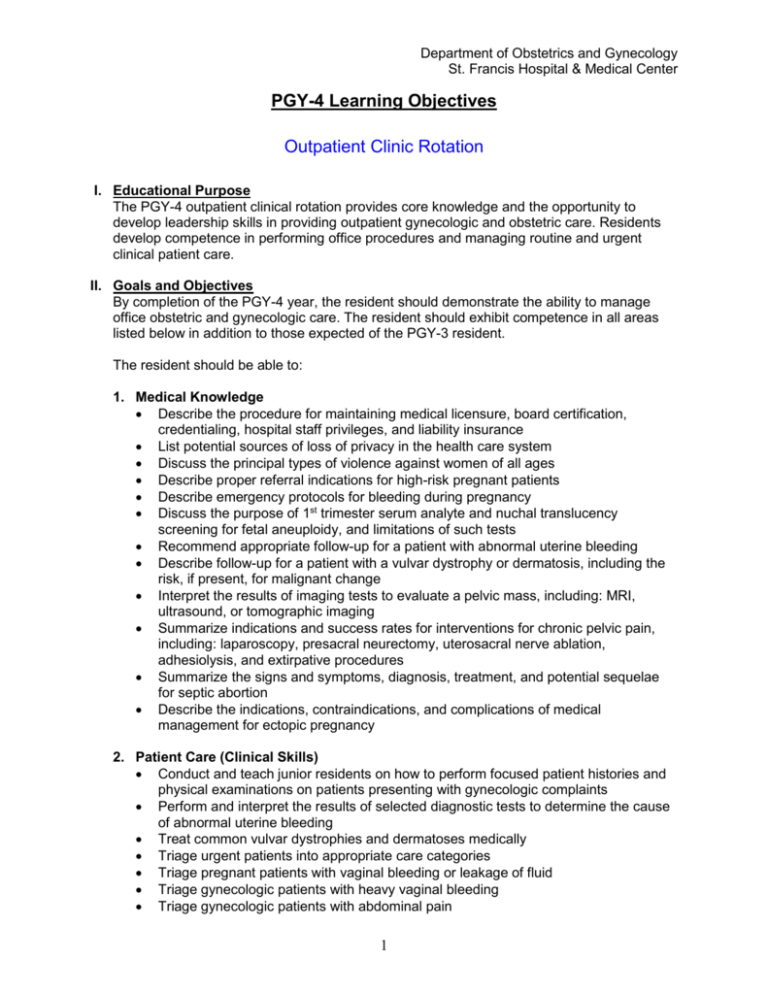
Department of Obstetrics and Gynecology St. Francis Hospital & Medical Center PGY-4 Learning Objectives Outpatient Clinic Rotation I. Educational Purpose The PGY-4 outpatient clinical rotation provides core knowledge and the opportunity to develop leadership skills in providing outpatient gynecologic and obstetric care. Residents develop competence in performing office procedures and managing routine and urgent clinical patient care. II. Goals and Objectives By completion of the PGY-4 year, the resident should demonstrate the ability to manage office obstetric and gynecologic care. The resident should exhibit competence in all areas listed below in addition to those expected of the PGY-3 resident. The resident should be able to: 1. Medical Knowledge Describe the procedure for maintaining medical licensure, board certification, credentialing, hospital staff privileges, and liability insurance List potential sources of loss of privacy in the health care system Discuss the principal types of violence against women of all ages Describe proper referral indications for high-risk pregnant patients Describe emergency protocols for bleeding during pregnancy Discuss the purpose of 1st trimester serum analyte and nuchal translucency screening for fetal aneuploidy, and limitations of such tests Recommend appropriate follow-up for a patient with abnormal uterine bleeding Describe follow-up for a patient with a vulvar dystrophy or dermatosis, including the risk, if present, for malignant change Interpret the results of imaging tests to evaluate a pelvic mass, including: MRI, ultrasound, or tomographic imaging Summarize indications and success rates for interventions for chronic pelvic pain, including: laparoscopy, presacral neurectomy, uterosacral nerve ablation, adhesiolysis, and extirpative procedures Summarize the signs and symptoms, diagnosis, treatment, and potential sequelae for septic abortion Describe the indications, contraindications, and complications of medical management for ectopic pregnancy 2. Patient Care (Clinical Skills) Conduct and teach junior residents on how to perform focused patient histories and physical examinations on patients presenting with gynecologic complaints Perform and interpret the results of selected diagnostic tests to determine the cause of abnormal uterine bleeding Treat common vulvar dystrophies and dermatoses medically Triage urgent patients into appropriate care categories Triage pregnant patients with vaginal bleeding or leakage of fluid Triage gynecologic patients with heavy vaginal bleeding Triage gynecologic patients with abdominal pain 1 Department of Obstetrics and Gynecology St. Francis Hospital & Medical Center Describe the long-term follow up for patients with a STD, including assessment of the patient’s sexual partner, discussion of preventive measures, and review of serious sequelae Counsel patients with a pelvic mass Counsel patients with an abnormal prenatal aneuploidy screening test Counsel patients with abnormal PAP smears 3. Patient Care (Management Skills). Teach and supervise PGY-2 and PGY-3 residents in the proper technique of all the following procedures: Detailed GYN ultrasound evaluation Vulvar biopsy Endometrial Biopsy Colposcopy Excision of cyst (vulvar) Fitting a pessary Transabdominal sonography for basic fetal biometry Transvaginal sonography for first trimester pregnancy viability and dating 4. Practice-Based Learning Formulate and answer clinical questions that arise from patient care interactions Exemplify the ability to interact with the most challenging patients to give junior residents and students a role model to follow Incorporate evidence-based medicine into daily practice Demonstrate understanding of deviations from standard practice and its implications Incorporate feedback from evaluations to improve skill base Update work-hour logs on a weekly basis and work efficiently to maintain compliance with the 80-hour work week Keep an updated patient log as detailed in the ACGME website Participate in quality assurance activities of the department Use of information technology: UpToDate, Emedicine, PubMed literature search, Cochrane Database, etc. Complete annual on-line certification courses and other requirements for hospital privileges (such as PPD testing) in a timely manner 5. Communication / Interpersonal Skills Present pertinent obstetrical history and physical findings to team members and consultants in a clear, concise fashion Demonstrate caring and respectful interactions with the obstetric patient and her family Counsel patients in language and manner appropriate to their level of education and understanding Coordinate the care of complicated patients by continually updating the patient care team on the status of the patients Interact respectfully and professionally with all members of the patient care team, including: attending physicians, nursing staff, resident staff, medical students, social services, translators, etc. Interact respectfully and professionally with departmental and hospital administrative staff Provide constructive feedback to fellow residents, medical students, and nurses-intraining 2 Department of Obstetrics and Gynecology St. Francis Hospital & Medical Center 6. Professionalism Participate actively in the education of fellow residents, medical students, and nurses-in-training Acknowledge limitations in knowledge and skills and exercise good judgment in seeking assistance from peers, attendings, and nurses Advocate for patients within the healthcare system Demonstrate respect and sensitivity to issues of diversity with patients, peers, nurses, and administrative staff Uphold the ethical principles of our specialty as detailed by ACOG and AMA Abides by HIPPA regulations Demonstrate ability to receive both positive and negative feedback with appropriate insight and professionalism 7. Systems-Based Practice Order diagnostic tests with attention to clinical relevance and cost-effectiveness Coordinate use of consultants and ancillary services personnel to create an effective patient care team Anticipate patient needs in discharge planning and follow-up Follow clinical pathways Demonstrate judicious and efficient resource utilization Coordinate and define the roles and responsibilities of healthcare team members Represent the residency in quality improvement activities of the department Demonstrate effective use of hospital computer system (Carelink), digital imaging system, medical records, and the dictation system Types of Clinical Encounters The PGY-4 resident on this rotation is responsible for examining and caring for all patients who are scheduled to be seen during that clinical session. These patients include, among others, women scheduled for routine obstetric and gynecologic care, outpatient consultations, and emergency visits. The PGY-4 resident will participate in the management of a variety of medical conditions affecting the health of a woman as well as gynecologic-related complications, including: Diseases of the urinary system Infectious diseases Hematologic disorders Cardiopulmonary disease Gastrointestinal disease Neurologic disease Endocrine disorders (including diabetes mellitus) Collagen vascular disorders Psychiatric disorders Substance abuse Emergency care / trauma Pelvic inflammatory disease Endometriosis Postoperative complications First trimester pregnancy loss Pelvic mass Ectopic pregnancy 3 Department of Obstetrics and Gynecology St. Francis Hospital & Medical Center III. Rotation Structure The PGY-4 resident will review in detail the goals of the rotation before the first day of the rotation. The resident will actively participate in: 8:30 AM-5:00 PM: Attend select outpatient clinics (below) and assist with all patients that are scheduled to be seen during that session. i. Monday: Resident GYN clinic in the Women’s Center ii. Tuesday: Continuity Clinic iii: Wednesday: Resident GYN/Colpo clinic in the Women’s Center iv. Thursday: Resident GYN clinic in the Women’s Center/Urogyn PM v: Friday: Resident Lecture Series IV. Resident Supervision The PGY-4 resident’s daily activities fall under the supervision of the Women’s Center Attending, which provides opportunity for immediate feedback. Procedures are performed under the direct supervision of the Attending Physician. V. Reading List and Educational Materials Textbooks: (i) William’s Obstetrics; Gabbe S, et al (editors). Obstetrics: Normal and Problem Pregnancies; (ii) Katz’s Comprehensive Gynecology,Te Linde’s Gynecology; (iii) Pelvic anatomy ACOG Compendium UpToDate Clinical Reference Library Emedicine PubMed Cochrane Perinatal Database VI. Method of Evaluation The PGY-4 resident will receive on-site timely formative feedback from the Women’s Center Attending Physicians during this rotation. Global evaluations of PGY-4 residents are performed at the completion of the 4-week rotation by select Ob/Gyn faculty and reflect input from the attending staff, nurses, medical students, and patients. These evaluations will be available to the residents via the MyEvaluations.com system and will be reviewed by the resident with the Ob/Gyn Residency Program Director and/or Chairman during the resident’s semi-annual evaluation meetings. Cognitive assessment of the residents’ gynecologic skills is assessed by the gynecologic score from the CREOG examination. CREOG Competency cards: S-fac, C-fac, and Fac-1 cards Dictations Completion of work-hours log Completion of ACGME procedure log 4 Department of Obstetrics and Gynecology St. Francis Hospital & Medical Center Resident I have/have not accomplished the educational aims and objectives as noted above for this rotation. _______________________________________ Resident Printed Name _______________________________________ Resident Signature __________________________ Date Faculty Based upon written evaluations, and observed competency assessment, The Clinical Competency Committee of the faculty has determined that the resident has/has not met educational aims and objectives for this rotation. Program Director Based upon self evaluation and the Methods of Evaluation listed in VII above, the resident has/has not met the educational aims and objectives as noted above for this rotation. _______________________________________ Program Director/Associate Program Director Signature Last Updated: August 25, 2010 has 5 __________________________ Date



